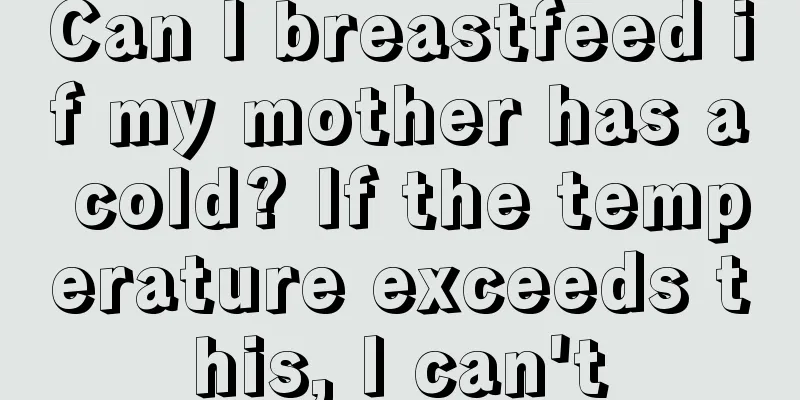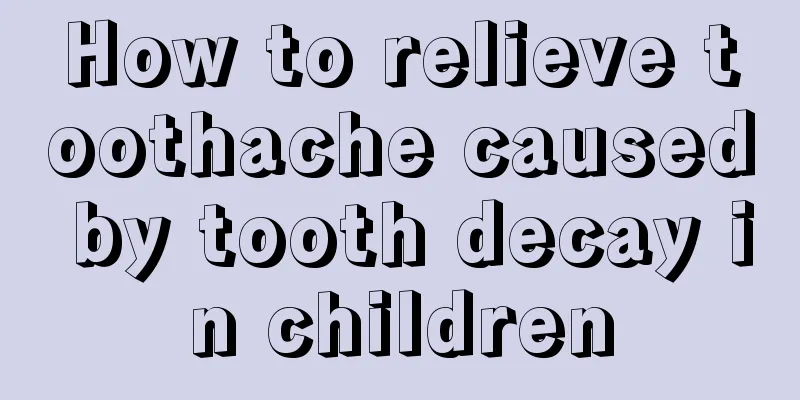Can I breastfeed if my mother has a cold? If the temperature exceeds this, I can't

|
If it is a common cold and the temperature is over 39℃, you should not breastfeed your baby because there is a risk of infection. If it is a viral cold and the temperature is over 37.5℃, you should not breastfeed your baby because it may cause diarrhea in your baby. Let's learn more about it below. Can I breastfeed if I have a cold?1. Common cold After a mother catches a cold, she can continue breastfeeding in most cases, except when she has a persistent high fever (body temperature above 39°C), in which case she must stop breastfeeding. This is because when a mother has a respiratory infection, the infection has usually been passed on to the baby before she discovers she is ill, and the mother's breast milk has already produced the corresponding anti-infection substance - antibodies. If she continues to breastfeed, the baby can get the milk containing these antibodies and resist the infection. Of course, while insisting on breastfeeding, the mother should actively treat her own infection. 2. Viral cold When mothers have a viral cold, they can take some Chinese patent medicines. However, when breastfeeding or talking to the baby, try to breathe away from the baby. This is because bacteria and germs may be transmitted to the baby through the respiratory tract during breastfeeding. If the cold is accompanied by fever, you can continue to breastfeed the baby as long as the body temperature does not exceed 37.5℃. If the body temperature is higher than 37.5℃, breastfeeding should be temporarily stopped because the milk concentrates when the mother has a fever, which may cause indigestion and diarrhea in the baby. What should I do if my mother catches a cold?1. Get enough rest When you have a cold, your body needs to mobilize the immune system to fight the virus, which is also physically demanding, so if you feel tired, just take a comfortable rest. 2. Blow your nose frequently When you have a cold, mucus like snot will appear in your nose and chest, which becomes a breeding ground for germs. So if you have snot, blow it out quickly and don't suck it back in. If you blow too hard or improperly, you may get ear pain. It is best to hold one nostril first, blow the other side clean, and then switch sides. 3. Drink more hot drinks Hot drinks can relieve nasal congestion, prevent dehydration, and relieve any discomfort from possible inflammation in the nose and throat. 4. Apply menthol ointment under the nose When you have a cold, your skin will dry out easily because you often rub your nose. Applying some ointment can not only relieve nasal congestion, but also make the painful skin feel better. But please note: it can only be used externally, don't rub it into the nose! 5. When nasal congestion is severe, you can wash your nose with warm saline solution. Using a flushing ball or nasal rinser similar to a baby nasal aspirator to flush the nasal cavity can relieve nasal congestion and drive away viruses and bacteria. 6. Rinse your mouth more often Gargling can keep your mouth and throat moist and relieve sore throats. Gargle with warm saline four times a day. If your throat is itchy, you can also gargle with tea, which contains tannic acid, which can astringe the mucous membrane. Or you can gargle with honey, lemon juice, or apple cider vinegar mixed in warm water and cooled to room temperature. 7. Take a hot shower The hot steam can moisten your nasal cavity and relax you. If you are dizzy due to a cold, sit on a stool to prevent falling. Be careful not to catch a cold, dry your hair quickly after washing, and blow dry your hair. What medicine should I take if I catch a cold?1. Mothers can also take some vitamin C appropriately, and there is no need to take any special medicine at this time. 2. If the mother is going to take cold medicine, then take some Chinese patent medicine, such as Ganmao Qingre Chongji, Isatis root and other Chinese medicines. During the medication period, if you do not know which prescriptions, over-the-counter cold medicines or even Chinese medicines are suitable, then you must ask the doctor in detail and take the medicine according to the doctor's instructions. Can I breastfeed if my mother has a cough?A mother's cough does not affect breastfeeding. As long as the mother does not use drugs that are prohibited during breastfeeding, she can breastfeed without worry. However, when breastfeeding, you should pay attention that the mother can infect the baby through the respiratory tract. Therefore, in this case, the mother should wear a mask, change clothes frequently, and wash hands frequently. Do not have much contact with the baby at ordinary times, only contact when breastfeeding. The mother should also maintain a cheerful and optimistic mood, do not worry too much, drink more water and fresh juice, and the condition will generally improve quickly. |
<<: Which is better, natural birth or caesarean section? Which is more painful?
>>: What material is good for pacifiers? Liquid silicone is closest to the nipple.
Recommend
How old can babies watch TV? Can babies watch TV?
How old can babies watch TV? Can babies watch TV?...
What does it feel like for a pregnant woman to have her cervix opened? When is the best time to have her cervix opened?
The baby needs to pass through the cervix to come...
What brand of skin care products is good for breastfeeding? Does using skin care products during breastfeeding have any effect?
Skin needs care at all times. The methods of skin...
What is the reason why newborns' hair grows slowly? What should I do if my newborns' hair grows slowly?
The baby is born and the parents are very happy. ...
Are electric blankets considered high-power electrical appliances? What should you pay attention to when buying and using electric blankets?
Electric blankets are usually turned on for a whi...
What should I do if my 5-year-old baby has indigestion? What should I do if my stomach is uncomfortable?
Indigestion in 5-year-old babies is a common gast...
How about Kao toothpaste? Does Kao toothpaste contain fluoride?
Kao has many products under its umbrella, and the...
What kind of drinks are good for pregnant women?
There are many kinds of beverages on the market n...
Can babies eat water chestnuts? At what age can babies eat water chestnuts?
There are many things to pay attention to when it...
What should I pay attention to when buying a child safety seat? China's child safety seat regulations
Child safety seats are a safety protection tool t...
Should babies be separated from their mothers when they are weaned? What should we pay attention to when weaning babies?
Babies usually need to be weaned when they reach ...
Is Ariel laundry detergent a neutral laundry detergent? Is Ariel laundry detergent a low-foaming one?
So-called laundry detergents are also divided int...
Monkey Year Children's Bedtime Story: The Little Monkey King of Communications
A bedtime story every day helps children grow up ...
doppelherz German double heart folic acid tablets instructions_dosage
Folic acid tablets are taken by every woman who i...
Is having a second child the same as having a first child?
After the second-child policy came out, many pare...









